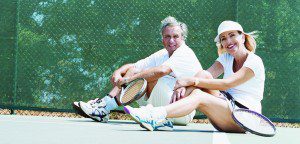By Dr. John C. Kagan, M.D.


But jumping into a new sport can leave you on the sidelines if you aren’t prepared. Before you start up your “spring training” exercise regimen – especially if you’re going from a fairly sedentary lifestyle to a more active one – keep these tips from the American Academy of Orthopedic Surgeons in mind:
1. Start slow. If you’re haven’t gotten a lot of exercise recently, don’t immediately set your sights on a marathon. It takes time to build up muscle strength and stamina. Warming up and cooling down before and after your exercise, along with gentle stretching, keeps muscles and joints flexible.
2. Keep it varied. If you try to swing a golf club or a tennis racquet every day of the week, you’re likely to end up with sore joints and muscles. Mix up your routines so you aren’t using the same muscles and joints intensely every day.
3. Don’t forget the benefit of rest. If you find yourself in sharp pain after a workout, your body’s trying to tell you you’re going too fast. As you schedule your workouts, make sure to leave time on the schedule for your muscle tissue to heal and rebuild, particularly if you’re starting up your exercise routine after a long period of relative inactivity.
4. Don’t forget your annual physical. If you’re over the age of 50 or have had major health issues, see your doctor before you start an intense exercise regimen to make sure it’s appropriate for you. Your doctor can also let you know what types of exercise might be most beneficial for you.
5. This is Florida – don’t forget the sunscreen and water. Even in spring, the sun beats down strongly, and it’s easy to get dehydrated quickly.
Repetitive motions are the most common sports-related injuries. Tennis elbow, swimmer’s shoulder, and stress fractures and shin splints in runners are some of the most common injuries seen by orthopedic surgeons. Repetitive trauma caused by overuse of the joints can lead to soreness and injury in a short amount of time.
Tendonitis is one of the most common culprits, leading to issues like golfer’s and tennis elbow. The tendon in the elbow swells and becomes inflamed after repetitive stress, which leads to pain, redness and tenderness. The bursa, a small, fluid-filled sac between the tendon, muscle and bone, may also become inflamed. Swimmer’s shoulder is often caused by tendonitis of the rotator cuff in the shoulder joint.
Shin splints and stress fractures are common injuries for runners. Stress fractures are tiny “micro-cracks” in the bone that result from the muscles being stressed beyond their ability to absorb the shock of impact when the foot hits the ground. Instead, the bone itself absorbs the sock of impact, and the force results in tiny fractures. Shin splints are caused by irritation and stress to the area of the leg where the calf muscle attaches to the shinbone.
Many of the most common sports injuries offer warning signs before they become too serious. Swelling, reduced range of motion, numbness and tingling, muscle tenderness and joint pain are indications of trauma to the body. Often, simple treatments such as resting, applying hot or cold compresses and taking over-the-counter pain relievers are enough to improve the symptoms. If the pain persists, however, or if it prevents you from enjoying your favorite athletic activity, make an appointment to speak with an orthopedic specialist as soon as possible. More intensive therapies, such as anti-inflammatory medications or injections or physical therapy, may be required to address the issue. More serious problems may require arthroscopic diagnosis and treatment by an experienced orthopedic surgeon.
If you have concerns about sports injuries or other orthopedic disorders, Dr. John C. Kagan and his staff are ready to answer your questions. Dr. Kagan has more than 30 years of experience as an orthopedic surgeon and sports medicine specialist treating patients in Southwest Florida. He specializes in treating patients with knee, shoulder and hip pain, as well as general orthopedics and hand surgery. For more information, visit www.kaganortho.com or call 239-936-6778.
 Southwest Florida's Health and Wellness Magazine Health and Wellness Articles
Southwest Florida's Health and Wellness Magazine Health and Wellness Articles

